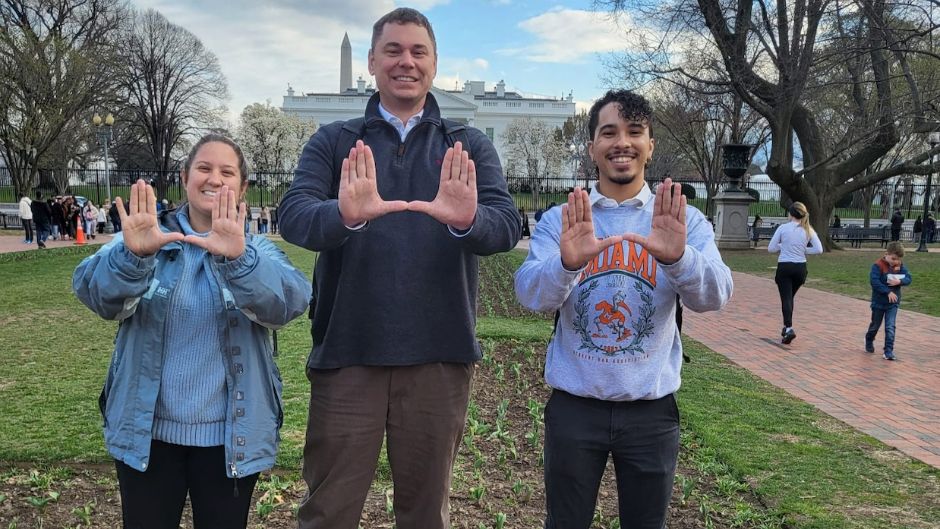Working with a committee of students, the HOPE Public Interest Resource Center brought back Legal Advocacy Pro Bono Alternative Spring Break trips this year — the first time since the COVID-19 pandemic hit. HOPE worked closely with the committee of students to select the host agencies for the trips according to the students' legal areas of interest.
HOPE assisted the students in leading fundraising initiatives to cover travel costs to make the opportunities financially feasible for any law student. The committee wanted to develop options on the front lines of immigration advocacy and environmental justice, so they were able to finalize weeklong volunteer opportunities with the South Texas Pro Bono Asylum Representation Project in Harlingen, Texas, and Oceana in Washington, D.C. Miami Law's Law Activity Fee Allocation Committee provided funding that covered the majority of the travel and hotel costs for the student participants.
ProBAR is an immigration advocacy project of the American Bar Association that assists immigrants in the Rio Grande Valley in Texas. The agency provides legal advice and representation to thousands of immigrants in rural South Texas each year and often hosts volunteer law students and attorneys for one-week opportunities. ProBAR organized a full itinerary for the four participating Miami Law students. They began the week with an orientation and then gained exposure to a wide array of ProBAR's projects, including assisting at a pro se help desk, observing at immigration court, completing intake and casework for clients, and participating in staff meetings.
2L Miami Public Interest Scholar Laura Curry enjoyed the opportunity and would recommend it to students in the future.
"I was able to see firsthand how our immigration procedures function at the border and assist with legal research for asylum applicant,” said Curry. “The staff at ProBAR were incredibly welcoming and truly took the time to explain the nuances of working in immigration law at the border. I encourage anyone interested in immigration law to volunteer with ProBAR if they ever get the chance.”
1L Miami Public Interest Scholar Christina Velazquez also gained insight and new skills from the trip.
“Volunteering with ProBAR provided me with invaluable hands-on, direct client experience and the opportunity to contribute to ProBAR's critical work assisting low-income individuals navigating the complicated immigration system," Velazquez said. "As I plan to represent gender-based violence survivors in their multi-faceted legal needs, it is essential for me to learn about the immigration system and the available remedies. During my short yet impactful time with ProBAR, I conducted legal research, participated in client intake interviews, translated an asylum application and supporting documents, and assisted a domestic violence survivor in completing her V.A.W.A. application. I am very grateful to all the ProBAR attorneys and staff for their warm welcome and mentorship and HOPE and L.A.F.A.C. for supporting and funding this trip."
Three other Miami Law students had an equally engaging spring break volunteering with Oceana, the largest international advocacy organization dedicated to ocean conservation. Oceana's work seeks to make the oceans more biodiverse, abundant, and healthy.
Volunteering with Oceana was a perfect fit for 2L Jonathan Painter.
"I came to Miami Law because I was interested in admiralty and international law,” said Painter. “I was interested in working with Oceana because one theme throughout my coursework is how vital international cooperation is to protect our oceans — and how difficult it is to build an international consensus. Roughly 3 billion people rely on the oceans for a regular supply of protein, and over 80% of international trade crosses an ocean on its way to market, so ocean conservation is more than just an environmental goal, it's an economic and national security interest for a significant portion of the world.”
Painter enjoyed the opportunity to support Oceana's work.
"Our alternative spring break was an amazing experience,” he said. “Oceana had several initiatives beginning, so they needed us to jump in, handle live research, and produce documents that analyzed law related to their upcoming projects. We spent a week handling important legal work that could play a role in the way Oceana approaches developing international law. We did find some downtime to take in the sights around D.C. One night we met up with some members of the Miami Law alumni community who work in the area. It was wonderful to hear about their post-graduation experiences and trade stories about Miami. This was my first pro bono project through HOPE, and the experience was so personally rewarding it's difficult to think of it as 'giving back.'"
For 1L Alex Llanos, participating in the opportunity with Oceana was one of the highlights of his 1L year.
"I got to volunteer at an environmental nonprofit and apply skills I learned in my first semester,” said Llanos. “My project involved researching county ordinances that required referenda to lift legal protections. I have always been interested in environmental conservation, so this was an awesome opportunity for me to combine my interests and professional goals. I feel like I grew so much on this trip and have a deeper appreciation of legal research."
If you are a Miami Law student interested in participating in a Legal Advocacy Pro Bono Alternative Spring Break trip next year, join the planning committee in the fall to work with HOPE to create an opportunity that most interests you. Email umhope@law.miami.edu with any questions or for more information.
Read more about the HOPE Public Interest Resource Center.

